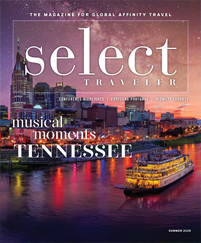Asheville, North Carolina
Though the University of North Carolina at Chapel Hill is the main UNC facility, the campus in Asheville is the one to visit. Now part of the University of North Carolina system, it started as an independent liberal arts college and grew that way for more than 40 years before being incorporated into the university system, and that free-spirited, liberal arts atmosphere still reigns in town today, especially in its award-winning food scene.
Outside the compact downtown of Asheville lie the other two biggest draws on the national tourism stage: the Blue Ridge Parkway and the 120-year-old Biltmore Estate, the largest privately owned house in the country. But even these blockbuster attractions are best experienced through Asheville’s locally focused culinary lens.
“You can take a forest-to-table tour where you go out in the morning and forage for whatever is in season, getting a good lesson on what’s around you that you usually ignore,” said Carli Adams, group communications and services manager for the Asheville Convention and Visitors Bureau. “Then three restaurants in town and a cocktail bar will prepare it for you. They also have America’s most visited winery. You can do wine-tasting sessions and even wine-and-chocolate or beer classes.”
Athens, Georgia
Though not established until 1801, the University of Georgia in Athens, the state’s flagship university in the system, was originally chartered in 1785. More than 200 years of academics have left their mark on both the university and the city, which is home to several of the state’s most important cultural landmarks as a result.
Rachel Watkins, information coordinator for the Athens Convention and Visitors Bureau, recommends that groups start their visit at the Georgia Museum of Art, the free state museum, and the State Botanical Garden of Georgia, where greenhouses ensure there is always something to see regardless of the season.
“These two state institutions are always relevant, and people don’t always realize they’re there,” she said. “When I take people to the museum, they always flip out over the quality of art and how accessible it is. They have everything from folk art to classics to beautiful modern art.”
Modern Athens has made the biggest name for itself in the worlds of food and music thanks to James Beard Award-winning chef Hugh Acheson, who helps incubate local food start-ups in addition to running two acclaimed restaurants in town. And musicians like R.E.M. and The B-52s have made the 40 Watt Club the place to catch tomorrow’s hit rock group.
Knoxville, Tennessee
The headquarters of the University of Tennessee system, Knoxville’s UT dates back to the late 1700s, predates Tennessee’s entrance into the Union and is one of the oldest universities in the country.
Many groups use Knoxville as a stop on the way to or from Great Smoky Mountains National Park, which is just an hour away, but the former industrial city has turned over a new, much more artistic leaf since its moment in the sun for the 1982 World’s Fair.
It is at the Sunsphere, the focal point of the World’s Fair Park and the city, that groups should begin their visit to get an orientation to the city from atop the 26-story structure. On a clear day, you can stand at the top and take in the rolling foothills of the Smokies before getting to know the city from ground level around Gay Street and Market Square.
Visit Knoxville offers a welcome talk as a hop-on service or on-site in their office, where groups can also catch a live concert during lunch hour, as well as a collection of handicrafts from local artisans, six days a week.
Depending on the length of your visit, Shorter recommends stopping in at least one or two of Knoxville’s protected historic homes, among them the Mabry-Hazen House, which served as the headquarters for both Union and Confederate forces during the Civil War, and the 1700s log cabin of James White, the surveyor who laid out Knoxville. Passes are available for all seven historic sites.









